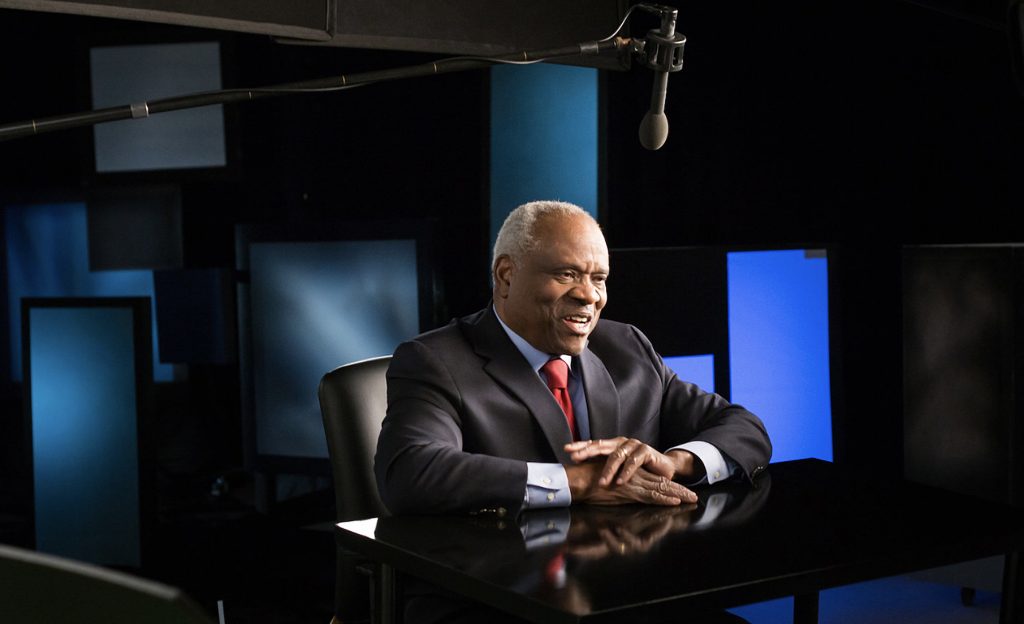“For what will you die?”
These are the words that passed through Clarence Thomas’ head after the death of his grandparents, who had raised him. His life’s answer forms the basis for the recently released documentary, “Created Equal: Clarence Thomas in His Own Words.”
Released Jan. 31, in time for February’s Black History Month, the Manifold Productions documentary written and directed by Michael Pack offers an in-depth view into the African American Supreme Court justice’s life and career.
In response to the string of headlines, political cartoons, and offhand comments that over the years have fueled strong opinions but vague understandings of Thomas’ life and character, the film is marketing itself as a straightforward account of “the story you didn't know.”
To live up to its title, its narrative structure relies primarily on direct interviews with the justice himself and his wife, Virginia, as well as passages from his memoir. In just under two hours, viewers get a thorough presentation of his multifaceted and intriguing life, which includes his experiences of rural and urban poverty, faith, radical ideology, conversion, and discrimination.
The film opens as a simple, almost casual conversation. The justice sits at a table, a generic pattern of blues and grays draped behind him, and chats with the off-screen interviewer about whether he should remove his glasses for the interview. (“Well, except for the cover of my book, I normally wear them,” he chuckles.)
Instantly, Pack sets the tone that this documentary aims to give us Clarence Thomas unfiltered — which, we quickly learn, seems to be a rarity.
Throughout his career, Thomas’ unique position as a black conservative has made him a controversial figure. In the film, Thomas explains that as his career drew him into the public eye, he was frequently seen as “not really black” because he held views that clashed with predominantly liberal black organizations and writers.
“How is that different from segregation?” he reflects. “How is that different from being told, ‘You can’t walk across that park’? [Their reaction to me was], ‘Oh, you can’t think those thoughts!’ … [But] you can’t live freely without having your own thoughts.”
By letting Thomas describe his childhood, schooling, and career, “Created Equal” highlights the context surrounding his moral, political, and legal opinions, and demonstrates what led him to adopt them. As a result, the film lends credence to the justice’s intellectual development, regardless of whether the viewer agrees with his viewpoints.
Specifically, the film refutes the notion that from an early age Thomas had been indoctrinated into a “segregationist” mindset that drove him into blindly working for the “racist” Reagan administration, as some of his opponents at the time contended.
In intricate detail, Thomas relays his journey from Catholicism to the radical Black Power movement and back again, as well his path toward an understanding of America’s founding as grounded in natural law. Each step of the way, Thomas describes what prompted his discoveries and decisions. The goal here is clear: to assert himself as a man in earnest and a man of principle.
Still, this documentary can seem a little too bare bones and quiet, especially when compared to the fast pace and action of other blockbusters and docudramas. Nonetheless, “Created Equal” is a documentary and doesn’t try to be anything else.
But the film’s simplicity actually helps achieve its intended effect: to enlighten and move the viewer by allowing Thomas’ story speak for itself. In the unadorned interview setting, we see Thomas’ convictions and emotions up close and personal.
He laughs when reminiscing about his grandfather, lights up when talking about his work studying the Founding Fathers, and cringes when he recalls his strenuous confirmation process to the Supreme Court, which seized the nation’s attention when Anita Hill’s allegations of sexual assault burst onto the scene.
When it comes to this last topic, the film inserts the viewer directly in the tempest. Weaving together archival footage of the grueling Senate hearings with Thomas and Virginia’s recollections of those days, “Created Equal” brings to life the acrimony and emotional strain that embroiled the entire course of events.
In today’s notoriously polarized political climate, reliving these vitriolic moments is an eerie reminder that the problems of today are anything but new.
Whatever one’s opinions of Clarence Thomas’ political inclinations, moral convictions, and legal theories, “Created Equal” deserves credit for its clear-eyed look at one man’s journey from poverty to fame, and at the toll that 20th-century American society took on countless black people pursuing freedom, equality, and justice in the U.S.
For that, it is an excellent film choice for Black History Month and worthwhile food for thought and discussion.
“Created Equal” is now showing in theaters across the country and will be broadcast on PBS this May.

